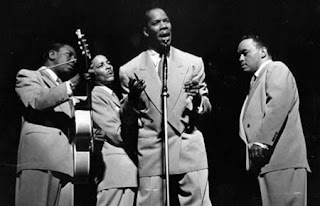The Ink Spots were an American Vocal Jazz group who gained international fame in the 1930s and 1940s. Their unique musical style presaged the rhythm and blues and rock and roll musical genres, and the subgenre doo-wop. The Ink Spots were widely accepted in both the white and black communities, largely due to the ballad style introduced to the group by lead singer Bill Kenny.
In 1989, the Ink Spots (Bill Kenny, Charlie Fuqua, Deek Watson, Jerry Daniels and Orville Jones) were inducted into the Rock and Roll Hall of Fame[1], and in 1999 they were inducted into the Vocal Group Hall of Fame. Since the Ink Spots disbanded in 1954, there have been well over 100 vocal groups calling themselves "The Ink Spots" without any right to the name, and without any original members of the group. These groups often have claimed to be "2nd generation" or "3rd generation" Ink Spots.
In July 1934 they accepted a booking at the Apollo Theater, New York, supporting Tiny Bradshaw. At this point they had changed their name to "The 4 Ink Spots". Later in 1934, the Ink Spots achieved international success touring the UK with Jack Hylton's Orchestra, one review in the Melody Maker stating
They first recorded for Victor Records in 1935, but although the group was growing rapidly in popularity, their early record releases were not commercially successful. Their first recordings included songs such as "Swingin' On The Strings", "Your Feet's Too Big", "Don't 'Low No Swingin' In Here" and "Swing, Gate, Swing".
In 1936, Daniels was replaced by a 21-year-old singer from Baltimore, Bill Kenny, who signed on with the Ink Spots after winning first place in an amateur contest at Harlem's Savoy Ballroom. Three years later, Kenny was credited for bringing the group to global success with his unusual high tenor ballad singing.
In 1938, after being in the group for two years, Kenny started to introduce the group to a new format that he called "Top & Bottom". This format was used primarily for ballads rather than the uptempo "jive" songs the group was used to performing. This format called for the tenor (Kenny or Watson) to sing the lead for one chorus followed by a chorus performed by bass singer Jones reciting the lyrics rather than singing them. After a chorus of the "talking bass" the lead tenor sang the rest of the song until the end. The earliest example of their "Top & Bottom" format is from a radio broadcast from 1938. The song entitled "Tune In on My Heart" features Kenny taking the lead and Jones performing the talking bass.
The year 1938 also saw Kenny taking his first feature solo in Decca studios. His feature was on a song entitled "I Wish You the Best of Everything". Although it wasn't in the "Top & Bottom" format it was a ballad and used the signature Ink Spots guitar intro. Even though it got a good response, it wasn't very successful in terms of record sales and didn't reach the pop charts.
On January 12, 1939, the Ink Spots entered Decca studios to record a ballad written by a young songwriter named Jack Lawrence. This ballad, "If I Didn't Care", was to be one of their biggest hits, selling over 19 million copies and becoming the 8th-best-selling single of all time. It was also the first recording by the group to reach the US Pop Charts. Despite its popularity, "If I Didn't Care" never reached #1 on the US Pop Charts, staying at #2 for several weeks. This is the first studio recorded example of the Ink Spots "Top & Bottom" format with Kenny singing lead and Jones performing the "talking bass". For this recording, each member was paid $37.50; however, after the record sold 200,000 Decca destroyed the original contract and the group was paid an additional $3,750. This was the recording that brought the group to global fame and established the "Top & Bottom" format as the Ink Spots "trademark". From 1939 until the group's disbanding in 1954, many of their songs employed this format. The year 1939 also saw the Ink Spots at the top of the US Pop Charts with five other recordings that featured Kenny in the "Top & Bottom" format. Their biggest hit of 1939 was the Lombardo, Marks & Hill ballad "Address Unknown". This was their first #1 hit on the US Pop Charts. Other chart toppers from 1939 included "My Prayer", "Bless You", "Memories of You", and "I'm Gettin' Sentimental Over You".
Read more on Wikipedia
Listen to The Ink Spots on Swing City Radio. We are a Big Band Radio Station playing a wide selection of Big Band and Swing music.
Swing City Radio plays The Ink Spots - Listen to our station and hear the songs:
I Don't Want To Set the World on Fire
Whispering Grass (Don't Tell The Trees)
When The Swallows Come Back To Capistrano
Java Jive







